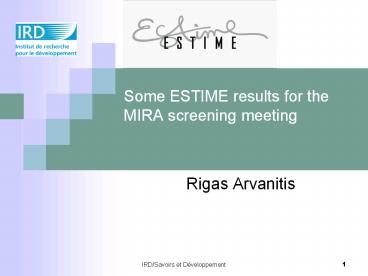Some ESTIME results for the MIRA screening meeting
1 / 22
Title: Some ESTIME results for the MIRA screening meeting
1
Some ESTIME results for the MIRA screening meeting
- Rigas Arvanitis
2
ESTIME Objectives
- Description of the state-of-the-art in research
in all scientific fields - Design of indicators for policy making
- Participate in the debates on how to enhance
research (evaluation, university, etc.) - Promote science studies in Med countries
3
ESTIME results on research
- Growing production
- A peculiar form of specialisation Engineering
and applaied physico-chemical sciences - Small but dynamic research communities
- Institutional changes in some countries
- Economic relevance is becoming a reality
4
(No Transcript)
5
(No Transcript)
6
(No Transcript)
7
(No Transcript)
8
Growth pattern
9
Social sciences production Maghreb --
1980_86 1987_92 1993_98 1999_2004 1980_2004
Morocco 1702 2234 3204 4663 7703
Algeria 568 821 1200 1815 3005
Tunisa 737 924 1308 1570 2850
10
A marked specialization pattern 1/3
11
A marked specialization pattern 2/3
12
A marked specialization pattern 3/3
13
(No Transcript)
14
Research personnel
Country Personnel Head count EPT EPT/ 106 h
Algeria 12000 enseignants-chercheurs (?)1400 researchers, 5000 (?) 156
Jordan 42151 (of which 15 800 Sc. Eng and 62 univ.) 1464 280
Lebanon 13 770professors (?) 316 researchers f.t. 712 178
Morocco 14 616 professors2900 researchers 8000 doctoral candidates 5000 8000 166 (433)
Tunisia 25445 prof. of which 758F.T. and 9723 students 3rd cycle 14650 492 (1465)
15
Budgets for RD as of GDP
Pays 1998 2001 2004
Algeria 0,16 0,27 0,21
Egypt 0,20 0,19 -
Jordan 0,38 0,34 (2003)
Lebanon 0,22 (2006)
Morocco 0,32 0,71 0,80
Palestin.T. Half million for science fund
Syria 0,2 (?)
Tunisia 0,43 0,53 1,00
16
A diversification of funding sources
- Tunisia relative diminishing funds and more
international cooperation RD in entreprises. - Morocco More private sector (6 in 1998 ? 12,3
en 2003). - Lebanon diversification of funds at AUB (int.
coop., foundations, NGOs, entreprises) public
funding is lowing (in relative termes at IRAL). - Syria creation of research funds in the
universities.
17
Low absorption capacity of national research
systems
- Important difference between promised budgets and
implemented funds ( eg. In all countris where
data was available) - Important differential between allocated funds
and spent funds (in som ecases can go up 60) - Some institutions have a low ability to respond
to international funds.
18
Three models of governance
Syria Egypt Iraq Centralized type of governance, but decentralized performance Research in large public research centres and universities Large public universities
Lebanon Jordan Decentralized governance Research in pubprivate universities
Algeria Morocco Tunisia Centralized governance Large public universities Research mainly in universities and public research institutes
19
Some additional results (1)
- Strong structuring of the research activity (eg.
Tunisia, Morocco) - Active evolutions Egypt
- Evaluation (teams, programmes) is still not in
the agenda - Social sciences out of the radar... But more than
half of the students.
20
Some additional results (2)
- Growing RD activity in enterprises
- Bridging institutions are rare and have still a
low activity /tech transfer units have low
activity legal issues. - Inventive policies in innovation (a world of
innovation) - A suggestion have more private consultancies in
charge of relating the research-enterprises
linkages.
21
Some ideas for the future
- Create a reference center for bibliometric data
effort on enhancing production visibility - Some coordination with research on innovation
EMIS - Additional work needed for both collection and
analyzing data (partnerships observatories)
22
Thank you !www.estime.ird.fr































